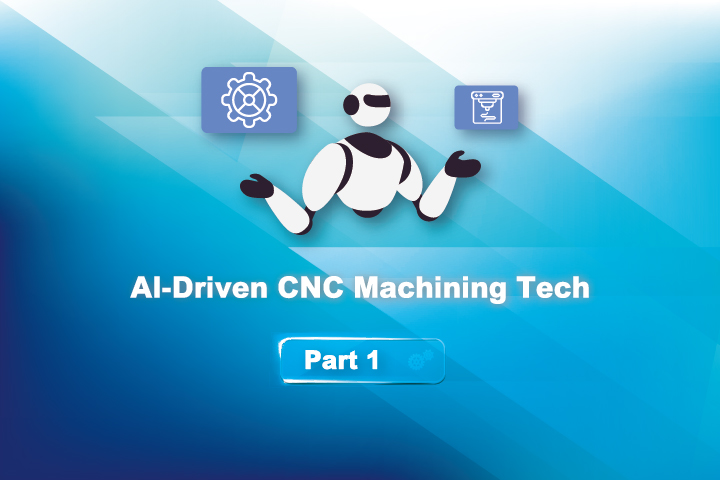Revolutionizing Smart Manufacturing: AI-Driven CNC Machining Technology Part 1

As the global manufacturing industry enters the era of intelligentization, the application of Artificial Intelligence (AI) technology in the field of Computer Numerical Control (CNC) machining has become a major driving force for industrial advancement.
Since 2016, Campro Machinery, a leading CNC machine manufacturer, has invested in the field of intelligent machinery, starting with factory visualization management. Now, the company can provide a range of smart manufacturing factory solutions, becoming a machining solution provider capable of keeping up with the digitalization trend. This article aims to delve into how AI plays a revolutionary role in CNC machining technology, not only improving production efficiency and enhancing quality but also leading the manufacturing industry towards greater automation and flexibility.
Through specific technical analysis and future trend forecasts, we will demonstrate how AI technology creates significant value in CNC machining and predict how this technological collaboration will shape the future of the manufacturing industry. Through this in-depth analysis, readers will gain a comprehensive understanding of AI's application in modern manufacturing and witness a truly meaningful industrial revolution.
I. Introduction: Introducing the Revolutionary Role of AI in CNC Machining
Over the past few decades, Computer Numerical Control (CNC) technology has dramatically transformed the manufacturing industry. With continuous technological advancements, CNC machining equipment can now execute complex machining tasks with unprecedented precision and efficiency. However, as market demand increases and production scales expand, traditional CNC technology faces new challenges: how to further improve production efficiency, reduce costs, and achieve higher levels of automation and flexibility. In this context, the introduction of Artificial Intelligence (AI) technology is gradually sparking a revolution in the field of CNC machining.
The core capability of AI lies in its ability to process and analyze vast amounts of data, making it a crucial player in the automation and optimization of manufacturing processes. In CNC machining, AI can be used to analyze machine operation data and adjust machining parameters in real-time to accommodate different machining conditions or material properties. This intelligent adaptability not only enhances machine operational efficiency but also significantly improves machining quality and consistency.
More importantly, AI enables predictive maintenance and fault diagnosis for CNC machines. By continuously monitoring the machine's operational status and performance, AI systems can identify potential machine faults and maintenance needs, allowing for proactive intervention before issues arise. This not only extends the machine's lifespan but also significantly reduces maintenance costs and unplanned downtime.
Furthermore, AI applications are driving CNC technology toward higher levels of automation. For instance, through machine learning algorithms, CNC machines can learn and optimize their machining strategies based on past machining experiences. This learning capability not only boosts machining efficiency but also enables machines to handle a wider variety of machining tasks, better adapting to changing production demands.
In summary, the CNC machine application of AI technology is initiating a revolution in the manufacturing industry. By integrating AI technology with CNC machines, manufacturing enterprises can enhance production efficiency and product quality while achieving greater operational flexibility and cost-effectiveness. Looking ahead, as AI technology continues to develop and improve, its impact on the CNC machining field will become even more profound, bringing more innovation and transformation to the global manufacturing industry.
II. The Core Role and Implementation of AI Technology
The application of Artificial Intelligence (AI) in the field of CNC machining is not just a technological innovation but an industrial transformation. The core role of AI technology lies in its ability to significantly enhance machining efficiency, precision, and adaptability, all achieved through intelligent data analysis and machine learning.
Firstly, AI can optimize the machining paths of CNC machines through data analysis. In traditional CNC machining, setting machining parameters often relies on the operator's experience and intuition. While this method is feasible, it may lack precision or efficiency when dealing with complex or unfamiliar machining tasks. AI technology, by analyzing past machining data, can accurately predict the optimal machining parameters, such as spindle speed, feed rate, and cutting depth, and automatically adjust these parameters to suit different material properties and machining requirements.
Additionally, AI's machine learning capabilities enable CNC machines to continuously learn and improve from actual machining processes. By continuously collecting machining data, AI systems can identify any unexpected behaviors or factors that may lead to defects in the machining process and adjust machining strategies to prevent similar issues from recurring. This self-optimization capability not only improves machining consistency and quality but also reduces reliance on human intervention.
AI technology also enables real-time monitoring and control of the machining process. Through various sensors installed on CNC machines, AI systems can monitor the machining status in real-time, such as tool wear, motor load, and machine vibration. This information is immediately analyzed, and AI can respond instantly to any detected abnormalities by adjusting machining parameters or pausing operations to prevent damage and ensure the quality of the final product.
Through these advanced functionalities, AI not only elevates the technical level of CNC machining but also greatly enhances the intelligence and automation of production processes. As these technologies continue to develop and be applied, AI will play an increasingly important role in the field of CNC machining, driving the manufacturing industry toward a more efficient and precise future.
conclusion
In summary, the CNC machine application of AI technology is initiating a revolution in the manufacturing industry. By integrating AI technology with CNC machines, manufacturing enterprises can enhance production efficiency and product quality while achieving greater operational flexibility and cost-effectiveness. Looking ahead, as AI technology continues to develop and improve, its impact on the CNC machining field will become even more profound, bringing more innovation and transformation to the global manufacturing industry.
This transformative potential of AI inCNC machining is best illustrated through a closer examination of its core capabilities and practical implementations. In the next section, we will delve deeper into how AI optimizes machining processes, enhances efficiency, and drives the automation of production lines.

